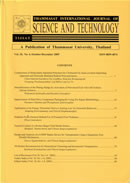ThaiScience
ThaiScience
THAMMASAT INTERNATIONAL JOURNAL OF SCIENCE & TECHNOLOGY
Volume 26, No. 01, Month JANUARY, Year 2021, Pages 127 - 141
Intention to adopt non-functional requirements determinants and consequences of perceived value and perceived risk
Siva Trichaisri
Abstract Download PDF
The objective of this paper is to examine software engineers’ intentions to adopt Non-Functional Requirements (NFRs). Examining software engineers’ evaluation of the perceived value and perceived risk of NFRs is the important factor of this study. Determinants of perceived value and perceived risk judgments were proposed and tested in order to determine what factors are influencing software engineers’ intention to adopt NFRs, which include perceived self-efficacy, management support, perceived complexity, and perceived cost of NFRs. A structural equation model (SEM) was applied to analyze the data. The results showed that perceived utilitarian value and hedonic value had significant influence on software engineers’ intention to adopt NFRs. Perceived risk was not found to have significant direct effect on adoption intention, but it significantly impacted utilitarian value judgment. Among the proposed determinants, perceived self-efficacy was found to have the largest impact on both utilitarian value and hedonic value, whereas perceived complexity was found to have the largest impact on perceived risk. This study contributes to a theoretical understanding of the factors that promote NFRs adoption on the individual level and suggests practical implications for system development managers to promote software engineers’ willingness to work on NFRs.
Keywords
Adoption intention, Non-functional requirements, Perceived risk, Perceived valueTHAMMASAT INTERNATIONAL JOURNAL OF SCIENCE & TECHNOLOGY
Published by : Thammasat University
Contributions welcome at : http://www.tijsat.tu.ac.th
